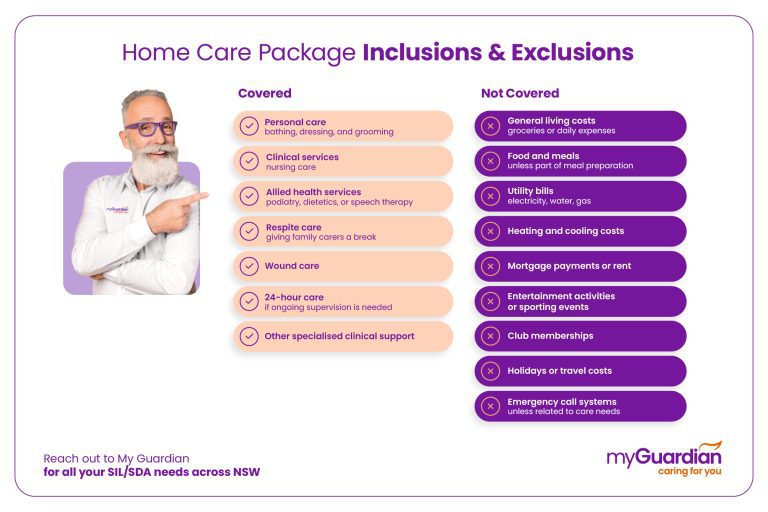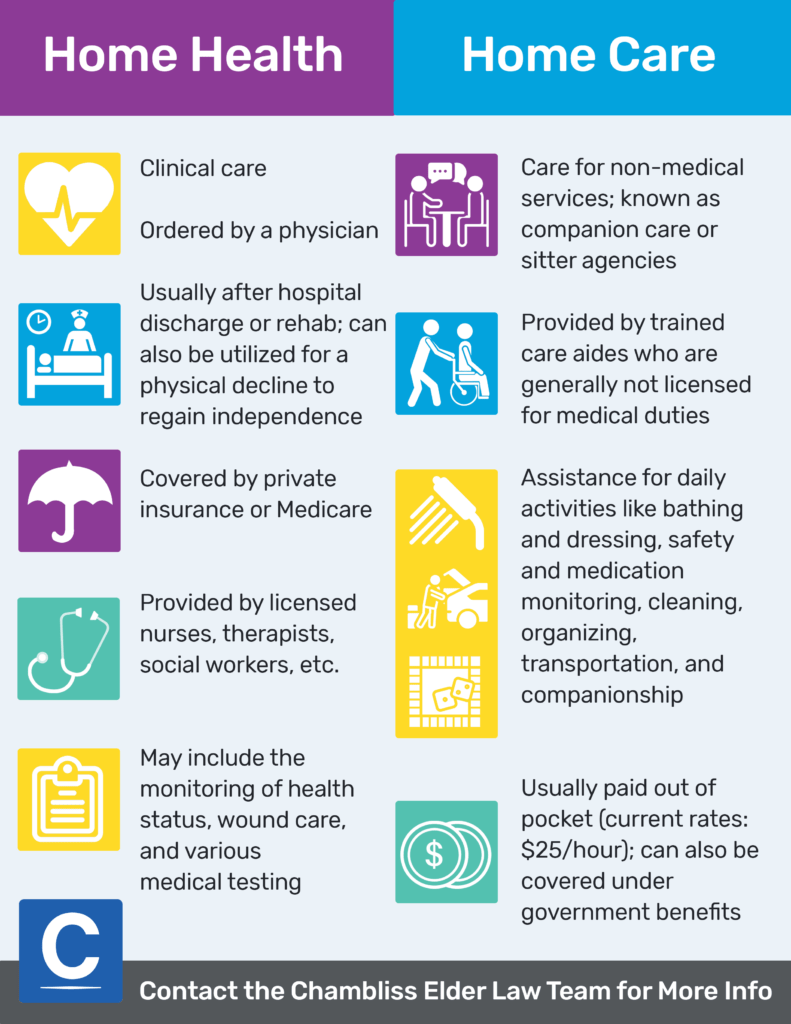The role of home care package providers in long-term disability care planning
The Importance of Home Treatment in Impairment Support: Discovering NDIS Registered Solutions
Home treatment is a basic facet of disability assistance, particularly within the framework of NDIS signed up services. It gives crucial solutions that foster independence and improve overall lifestyle for individuals with specials needs. By offering tailored support, these services deal with unique needs and choices. Nevertheless, the effectiveness of home care counts on continuous communication with NDIS planners. This dynamic partnership exposes much deeper understandings right into the transformative possibility of tailored support. What challenges and successes emerge in this evolving landscape?
Recognizing the Role of Home Care in Impairment Support
Home treatment plays a crucial duty in the assistance of individuals with disabilities, supplying substantial services that advertise self-reliance and enhance lifestyle. It encompasses a variety of help tailored to meet the one-of-a-kind demands of each person, including individual care, house jobs, and mobility support. Educated caregivers offer friendship and emotional assistance, cultivating meaningful links that battle social isolation.Furthermore, home care solutions are made to adapt as situations alter, guaranteeing that people receive the suitable level of care throughout their lives. This flexibility permits the integration of new treatments or modern technologies that may occur. By prioritizing the person's routines and preferences, home treatment encourages them to preserve control over their everyday tasks. Eventually, the duty of home care in impairment assistance is important, as it not only offers practical support yet also verifies the self-respect and freedom of those it serves.

Advantages of Personalized Support at Home
Customized help at home deals numerous advantages tailored to individual demands - home care package providers. By creating customized assistance plans, caretakers can greatly improve the self-reliance of individuals with disabilities. This approach not only advertises freedom however also promotes a feeling of dignity and self-worth
Tailored Assistance Strategies
Customized assistance strategies play a necessary duty in enhancing the high quality of life for people with disabilities. These individualized plans are developed to deal with the unique needs and preferences of each person, making sure that support services line up with their certain objectives and lifestyle. By entailing customers in the preparation procedure, customized support strategies promote a sense of possession and empowerment. This customized strategy enables caregivers to offer pertinent support, whether it includes daily living tasks, social interaction, or ability advancement. In addition, customized plans can adjust to changing conditions, reflecting the developing requirements of the person. Inevitably, this tailored support enhances not only everyday functioning yet also emotional wellness, enhancing the significance of a tailored strategy in handicap support services.
Boosted Independence Opportunities
People with specials needs profit considerably from customized help at home, as it promotes improved freedom opportunities. Customized assistance permits individuals to take part in daily tasks with higher self-confidence and autonomy. Home treatment solutions can consist of assistance with personal treatment, meal preparation, and family administration, making it possible for clients to maintain their routines and choices. This tailored strategy cultivates a sense of control, encouraging individuals to make options that reflect their one-of-a-kind demands and objectives. In addition, the comfort of home creates a familiar setting, decreasing stress and anxiety and boosting psychological well-being. Overall, individualized assistance not just sustains essential daily jobs however additionally grows a more independent lifestyle, allowing people with specials needs to thrive within their areas and attain better personal satisfaction.
Introduction of NDIS Registered Home Treatment Solutions
NDIS signed up home treatment services incorporate various sorts of assistance customized to individuals with impairments (support at home provider). Comprehending eligibility and accessibility to these services is vital for maximizing the advantages of NDIS assistance. This overview will highlight the crucial elements of home care under the NDIS structure
Kinds Of Home Treatment
Home treatment solutions play a necessary role in sustaining people with specials needs, supplying a range of alternatives to meet diverse requirements. NDIS signed up home treatment services include individual treatment, which helps individuals with day-to-day tasks like bathing and clothing. Residential help assists preserve a safe and tidy living environment, while break treatment provides temporary alleviation for key caretakers. Community access solutions enable participation in entertainment and social activities, cultivating self-reliance and link. In addition, nursing care supplies medical support in the house, making certain wellness needs are satisfied. Treatment solutions, including occupational and physical rehabilitation, help in recovery and ability advancement. Together, these different kinds of home treatment add significantly to enhancing the top quality of life for individuals with specials needs.
Eligibility and Access
Exactly how can one access the necessary home care services offered under the NDIS? To qualify for these solutions, people have to satisfy particular qualification standards detailed by the National Impairment Insurance Plan. Candidates should show a considerable and permanent disability that impacts their daily functioning. The process begins with submitting an Access Request Form, that includes documents of the impairment and its influence on day-to-day live. When approved, people get a customized strategy describing their required assistances, consisting of home treatment services. These solutions can be accessed through NDIS-registered companies, that should adhere to strict high quality and safety and security requirements. Recognizing these steps guarantees people can efficiently important site navigate the NDIS system to obtain the essential assistance for their home care demands.
Benefits of NDIS Assistance
Accessing necessary assistance through registered services supplies people with handicaps a transformative chance to boost their lifestyle. NDIS registered home treatment services supply customized help, making sure that each individual's one-of-a-kind needs are met. These services encompass a large range of assistances, including individual care, flexibility assistance, and restorative solutions, all developed to promote self-reliance and wellness. Furthermore, registered service providers abide by rigorous quality criteria, assuring a high degree of care and safety and security. Participants also take advantage of enhanced adaptability, permitting them to choose service distribution techniques that finest suit their way of livings. Eventually, NDIS assistance fosters a feeling of community and empowerment, allowing individuals with handicaps to involve more completely in their day-to-days live and achieve personal goals.
Customizing support to private demands is crucial in handicap care, as each individual's choices and conditions vary considerably. The National Disability Insurance Policy Plan (NDIS) stresses the significance of individualized treatment plans that mirror the distinct goals and demands of each participant. This approach permits caretakers to concentrate on particular areas such as wheelchair aid, daily living skills, and emotional support, making certain that services are efficient and relevant.
Enhancing High Quality of Life With Home Care
While several individuals with disabilities face unique challenges, home care solutions can considerably enhance their lifestyle by offering customized support in familiar environments. These solutions foster independence, permitting people to participate in day-to-day activities that promote self-confidence and personal gratification. With customized treatment strategies, home treatment providers can deal with particular needs, whether it involves Continue support with personal health, meal preparation, or medicine management.Moreover, home care assists in social communications, motivating links with friends and family, which are necessary for psychological well-being. By staying in their very own homes, people experience a sense of stability and continuity, minimizing stress and anxiety connected with unknown environments. Furthermore, caretakers can provide companionship, helping to alleviate sensations of isolation. On the whole, home treatment not only addresses physical requirements however likewise enriches the psychological and social measurements of life for people with impairments, inevitably leading to a much more meeting and enjoyable existence.
Navigating the NDIS for Home Care Solutions
Assisting with the National Disability Insurance Policy System (NDIS) can significantly impact the performance of home treatment services for individuals with impairments. Recognizing the NDIS structure is essential for participants seeking appropriate funding for home care services. This process begins with determining private demands and objectives, which assists in tailoring assistance plans that line up with the individual's requirements.Navigating the NDIS includes familiarizing oneself with the qualification criteria, application procedures, and the planning procedure. Individuals should engage with NDIS planners to review their particular scenarios and preferred end results. This discussion guarantees that the needed home care solutions, such as personal care, assistance with day-to-day living, and healing support, are included in their plans.Furthermore, remaining upgraded on NDIS policies and any modifications in funding can encourage individuals to make enlightened options regarding their home care options, ultimately improving their independence and lifestyle.
Success Stories: Equipping Lives Via Home Treatment
Home treatment solutions have transformed the lives of lots of individuals with specials needs, demonstrating the profound influence of personalized support. Sarah, a young lady with cerebral palsy, acquired independence with customized home treatment support that allowed her to take care of everyday jobs and take part in neighborhood activities. In a similar way, John, who has autism, gained from a dedicated caregiver that helped him create social abilities and foster significant partnerships, improving his quality of life. These success tales highlight just how home treatment not only meets physical demands yet additionally advertises emotional health. Family members report boosted satisfaction, knowing their enjoyed ones get compassionate and professional assistance in a familiar atmosphere. As these instances illustrate, home care equips people with specials needs to thrive, encouraging self-sufficiency and improving overall life contentment. The transformative effects of such services emphasize the importance of home care in the broader context of special needs assistance.

Often Asked Concerns
How Can I Locate NDIS Registered Home Care Providers in My Area?
To find NDIS signed up home treatment carriers in a details area, individuals can go to the Website NDIS internet site, make use of the provider finder tool, or contact regional handicap assistance organizations for suggestions and assistance.
What Qualifications Should Home Care Workers Possess for Impairment Assistance?
Home care employees for impairment assistance ought to ideally have qualifications such as a Certification III in Person Support, appropriate experience, solid communication skills, compassion, and expertise of disability legal rights and person-centered treatment methods.
Are There Any Kind Of Costs Connected With NDIS Registered Home Care Providers?
Expenses related to NDIS signed up home treatment services can vary based upon individual demands, provider, and the degree of treatment needed. Individuals need to assess their strategies to understand particular funding and prospective out-of-pocket expenditures.
Can Home Treatment Services Accommodate Specific Social or Language Needs?

Exactly How Usually Can I Adjustment My Home Care Assistance Plan?
People can normally alter their home care assistance strategy as required, commonly at the very least annually or upon considerable life modifications. Routine evaluations assure that the strategy stays appropriate and successfully addresses developing individual circumstances and needs. Educated caregivers use friendship and psychological support, promoting significant links that deal with social isolation.Furthermore, home care services are made to adjust as situations change, guaranteeing that individuals get the suitable level of care throughout their lives. Home care services can consist of assistance with personal care, dish prep work, and home management, allowing customers to maintain their routines and choices. NDIS signed up home treatment solutions include individual treatment, which assists people with everyday tasks like showering and clothing. Via personalized care strategies, home treatment companies can address details requirements, whether it includes support with individual health, meal prep work, or drug management.Moreover, home care facilitates social communications, motivating connections with family and friends, which are essential for psychological well-being. Costs linked with NDIS registered home care services can vary based on individual requirements, service providers, and the level of treatment called for.